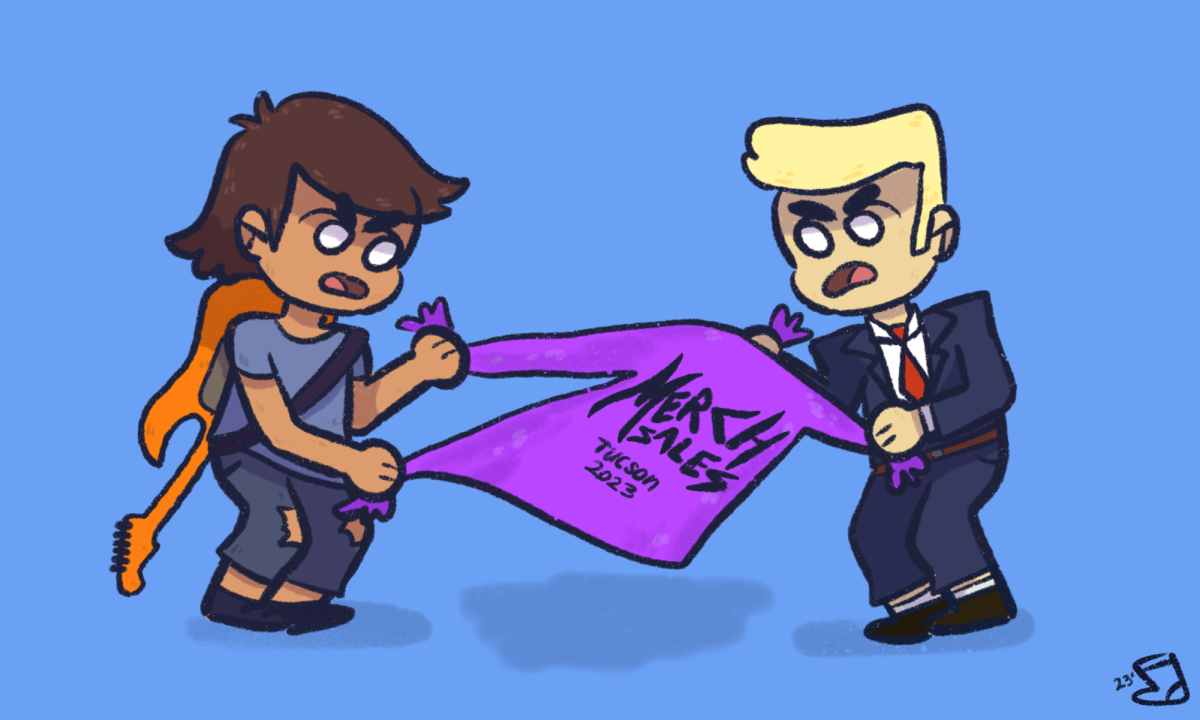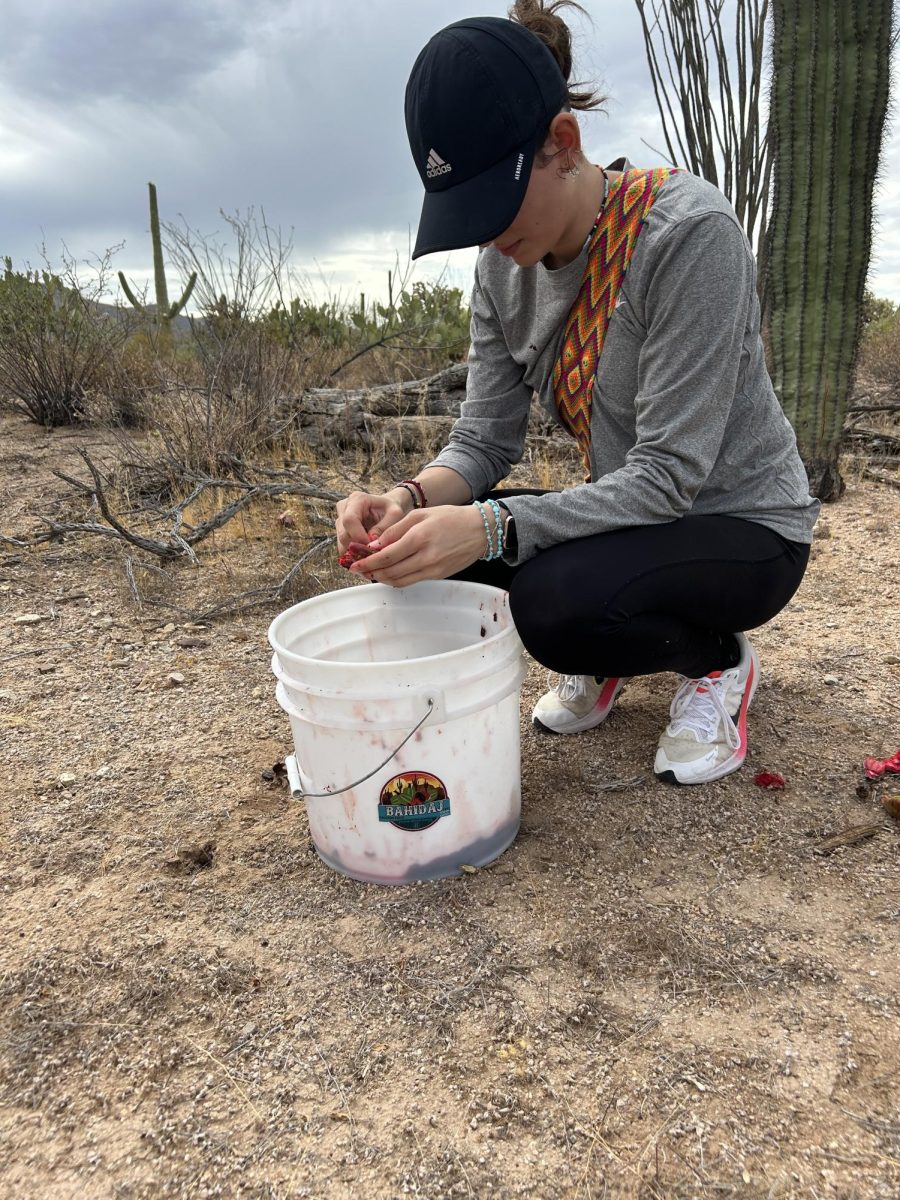On Feb. 14, 2022, Illuminati Hotties played a show at 191 Toole, a small local venue located in Downtown Tucson. Before leaving town, they had to pay the venue 20% of their merchandise sales.
This is an example of a merch cut, where a venue takes a set percentage of a band’s merchandise sales after a show, often limited to revenue from “soft” merchandise, such as T-shirts, hoodies, hats and socks, as opposed to physical copies of music, such as CDs and vinyl.
Tucson is home to an abundance of independently owned live music venues, including Club Congress, Groundworks, the Rialto Theatre and 191 Toole. These four venues are all relatively small, with Groundworks as the smallest, with a capacity of only a few hundred people, and the Rialto Theatre as the largest, with a capacity of 1,200 people.
Of the artists we reached out to concerning merch cuts at Club Congress and Groundworks, everyone who responded said that neither venue had charged them a merch cut. Brando Terrazas, the president of Atomic Music Group, which represents Trish Toledo, said that Toledo was not being charged a merch cut for her Oct. 5 show at Club Congress. Terrazas called Club Congress “one of the great indie venues that lets artists retain 100% of their merch sales.”
Brendan Dyer of the Los Angeles rock band Milly said that the band was not charged a merch cut by Club Congress for their Oct. 8 concert. Indie artist Veronica Everheart also said she’s never been charged a merch cut by Club Congress.
According to Logan Greene, the board president and executive director of Groundworks, not taking merch cuts is a matter of policy.
“We do not take a merch cut and never take a merch cut,” Greene said. “There are times where we have art vendors come, and we don’t charge a particular cut, but we ask for a 10-20% donation of what they made at that event. It’s not required. It’s just something that, as a non-profit, the donations help us operate.”
This is supported by both Everheart and the lead singer of AJJ’s Sean Bonnette, neither of whom were charged a merch cut for their Jan. 6 show at Groundworks.
The merch cut policies for the Rialto Theatre and 191 Toole appear to be less concrete.
The two venues are owned and operated by the Rialto Theatre Foundation, a 501(c)(3) nonprofit organization dedicated to “the stewardship and preservation of the historic Rialto Theatre.”
The artists we spoke to had differing experiences with both 191 Toole and the Rialto Theatre. Los Streetlight Curb Players, a local reggae fusion band, said that they’ve never been charged a merch cut for their performances at either the Rialto Theatre or 191 Toole. Miss Olivia and the Interlopers said that 191 Toole had not charged them a merch cut in the past, though they were not selling merch at their Oct. 20 show. Also, according to AJJ cellist Mark Glick, AJJ was not charged a merch cut for their show at 191 Toole on Oct. 1.
However, other artists said that they were being charged or had been charged a cut by 191 Toole or the Rialto Theatre. According to Todd Bartleson, senior vice president of MPI Talent Agency, which represents Japanese pianist Keiko Matsui, the Rialto Theatre charged Matsui a 20% merch cut for her concert on Sept. 12. Steve Schenck, a representative of Blue Oyster Cult, said that the band is being charged a merch cut for their show at the Rialto Theatre on Dec. 28, though he declined to give an exact percentage.
Eric Johanson, a blues rock guitarist who played at 191 Toole on Sept. 10, said he wasn’t charged a merch cut by the venue but only because he negotiated it out of their booking deal. He also said that he couldn’t recall what the venue’s usual percentage was.
And then there’s the aforementioned Illuminati Hotties, who were charged a 20% cut. Singer/songwriter Sarah Tudzin said that the venue also didn’t supply merch sellers.
The Rialto Theatre Foundation declined our request for comment.
Tudzin and Glick both talked about how merch cuts make it harder for a tour to be financially viable.
“It is exponentially harder to tour with venues taking aggressive merch cuts,” Tudzin said. “Merch is a major source of profit on tour. In the ecosystem of smaller bands, taking a merch cut could mean the difference between whether or not that band can afford to eat dinner or sleep in a bed or buy gas to get to the next city. In a much larger operation, merch cuts eat into the salaries of band members, whether or not you can level up your stage production, whether or not you can rent a comfortable vehicle to support long drives and grueling timelines.”
Glick points out that the cost of merch cuts is often passed onto fans.
“It ultimately hurts people who are going to shows because bands are going to have to pass that cost on,” Glick said. “We sell our shirts for 30 dollars, which doesn’t feel great. And we still have people coming up to us and saying, ‘Oh wow, they’re only 30 dollars? I was expecting 40.’ So some of these cuts are definitely getting passed on to people who are going to concerts.”
Everheart works both as a touring artist and as a show manager at an independent venue in Phoenix. According to Everheart, whether a venue will take a merch cut can be situational. She said that sometimes venues won’t charge merch cuts to local bands but otherwise will for nationally touring acts. This might explain why AJJ, a band local to Arizona, was not charged a merch cut by 191 Toole while Illuminati Hotties, who are from Los Angeles, were.
Everheart also said that it’s important to understand that the issue is complex, as independent venues don’t have the same financial resources as venues owned by massive corporations like Live Nation.
“There’s so many different things you could really look at,” Everheart said. “Who’s promoting the show? How much money is really being taken? Why did they take that money? How much money was made from a merch cut to keep the venue operational? I think those are all the questions that drive the reasons for and against merch cuts. In a perfect world, I don’t want them to exist, but I understand why.”
Glick estimated that approximately 70% of venues AJJ play at on their current tour will charge them a merch cut. He also said that he expects AJJ to pay every one of them, though they hope to talk some of the venues out of taking them from their opening acts.
“It’s all going straight to the top and coming from the top,” Glick said. “Merch cuts are so vile because I’ve straight up had people tell me we’re friends all day running the show, and at the end of the night, they’re like, ‘look dude, I don’t want to do this, but I almost got fired for not taking merch cuts. So just tell me what 15% is because I’ve got to do it.’ Nobody involved in the actual transaction wants it to happen. And the money is not going to the person who is actually taking it. So it’s this gross, gross feeling.”
Tudzin estimated that Illuminati Hotties are charged a merch cut at 50-70% of the venues they play. She said that the method of both merch cut calculation and collection “tends to change from venue to venue based on how big of a show it is, how much staff is on-site for the show, and what the general policy is surrounding merch.”
This is all representative of the harsh realities faced by both touring artists and independent venues, both of whom were severely financially impacted by lost revenues due to the COVID-19 pandemic. Glick said that many independent venues are being bought up by corporations like Live Nation, so much so that it has become something of a running joke within the band every time they visit a nice independent venue. “It’s like, who’s gonna own it next time we’re here?”
Everheart, a self-described proponent of independent venues and bands, shares the concern that Live Nation might be attempting to squeeze out independent venues.
“These bigger promoters like Live Nation that have the headroom to be able to afford to not take these cuts are kind of concerning for an indie venue because when a band is going to go tour, they are probably going to see the fact that Live Nation is going to make them more money versus Live Nation is trying to cut out all of their competition,” Everheart said.
Ironically, Glick said that Live Nation venues are the most notorious for taking merch cuts, as well as the most militant in enforcement.
“By and large, maybe 95% [of Live Nation venues] hire a person to count all of the merch in and out of the venue so they know how much you owe them,” Glick said. “It’s like two hours before doors, someone is there saying, ‘Let us know when you’re ready so we can count all of your stuff.’”
He says that the company would sometimes overpay on the door or the upfront cost for a band to play at a venue, only to charge a high merch cut percentage to make more money on the back end.
Everheart also pointed out that shows at independently owned venues can sometimes involve outside promoters, who may be taking a cut of merch irrespective of the venue’s policy. She said that if the promoter doesn’t have a representative at the show, it’s up to the venue to enforce those merch cuts.
“Live Nation will promote shows at indie venues,” Everheart said. “It’s a pain in the ass for the people who work [at the venue] because they have to represent Live Nation. And yet, it’s not a Live Nation venue. And so it kind of makes us look bad.”
Live Nation did not return our request for comment.
Merch cuts are part of a larger live entertainment ecosystem, and their application varies between venues and promoters. “The whole music industry is just like the Wild West,” Glick said. “There’s no set way that anything happens.”
Everheart said she believes that there should be changes concerning merch cuts while also acknowledging the complexity of making live entertainment financially viable for both artists and independent venues.
“It’s not a black-and-white issue, but it’s definitely an issue,” Everheart said. “I’m not really sure fully how to fix it. I’ve been trying to wrap my brain around that for a while […]. I worry a lot about every venue I go to.”
Follow the Daily Wildcat on Instagram and Twitter/X









